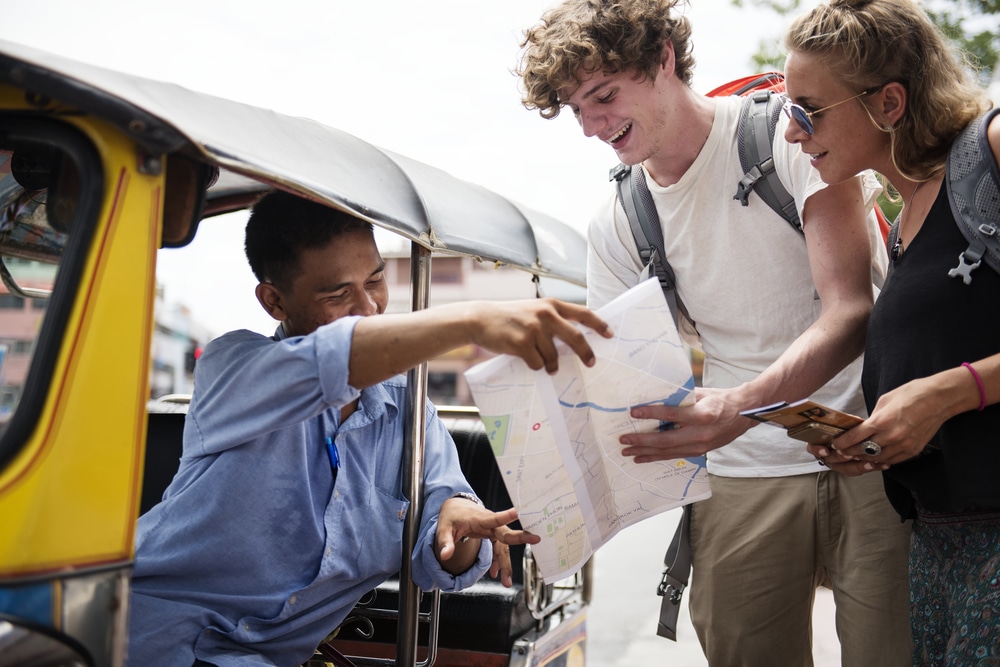Contents
- Common French Words and Phrases
- French Phrases to Introduce Yourself
- Questions for Traveling in France
- French for Getting Around
- Clarifying French Phrases
- Basic French Phrases for Shopping
- Phrases for Dining Out in French
- French Words for a Night Out
- How to Prepare for Traveling to France
- And One More Thing...
108 Useful French Travel Phrases

Having essential French travel phrases on hand can totally transform your trip. If you meet people, get lost or just need to ask a local some questions, these expressions and sayings will help you out in most scenarios and make your time in France truly memorable.
I’ll introduce you to 108 basic French phrases for travelers, as well as tips and cultural context so they’re easier to memorize ahead of time.
Download: This blog post is available as a convenient and portable PDF that you can take anywhere. Click here to get a copy. (Download)
Common French Words and Phrases

Let’s start with the absolute basics.
Oui (Yes)
Non (No)
Bonjour
(Hello)
Add a monsieur
(sir) or madame
(ma’am) to be polite.
Salut !
(Hi/Hey!)
This is a more casual version of “hello.” You’ll hear the young folks throwing this one around.
Au revoir (Goodbye)
À plus / À plus tard ! (See you/See you later!)
À la prochaine ! (See you next time!)
Bisous
/ Bises !
(Kisses!)
This is a casual way to say goodbye.
Bonsoir (Good evening)
Bonne journée ! ([Have a] good day!)
Bonne soirée ! ([Have a] good evening!)
Vous me manquez déjà ! (I miss you already!)
Pardon (Excuse me)
Merci (Thank you)
S’il vous plaît (Please)
Excusez-moi monsieur / madame (Excuse me sir/ma’am)
Parlez-vous anglais ? (Do you speak English?)
Comment dit-on … en français ? (How do you say … in French?)
French Phrases to Introduce Yourself

These phrases will help you out when meeting locals and trying to make French-speaking friends.
Je m’appelle… (My name is…)
Moi, c’est…
(Me, I’m…)
This is a more casual way of introducing yourself.
Comment vous appelez-vous ? (What is your name?)
Tu t’appelles comment ?
(What’s your name?)
Use this one for when you want to keep things casual, with the tu form.
Comment allez-vous ? (How are you?)
Ça va ? En forme ? (How are you? You good?)
Nous sommes arrivés
/ arrivées…
(We arrived…)
Use this phrase to let someone know when you got into town.
Nous restons…
(We’re staying…)
Use this phrase to explain to your new friends where you’re staying, as well as how long you’re staying.
Je vous présente…
(lit. “I present you…”)
This is another way of saying “This is [my]…” when you want to introduce two people to each other.
Enchanté/Enchantée. (Pleased to meet you.)
Je suis ravi
/ ravie de faire votre connaissance.
(I am glad/delighted to meet you.)
You’ll raise some impressed eyebrows if you bust out this fancy French “nice to meet ya.”
Je parle un peu français. (I speak a little French.)
If you’re learning French, chances are you’ll want to practice your language skills when you go out there. However, it can be intimidating approaching a native—letting them know that you’re not fluent will really put your mind to rest!
Saying je parle un peu français will enable you to continue practicing your speaking skills, while at the same time alleviating any pressure you might feel to talk fluently. Use this phrase when you’re first starting a conversation, or want to continue talking to someone in French.
J’apprends le français depuis… (I’ve been learning French for…)
People are sure to notice your French accent and they’ll probably want to know how long you’ve been learning the language of love.
Je suis là pour les vacances / le travail. (I’m here for vacation/work.)
After you’ve made your initial introductions, it’s likely that a person with whom you’re speaking will ask about the time you’re spending in France. While many people travel to the country for vacation, this isn’t always the case, so informing the other person of your reasons for traveling can help fuel the conversation you have.
It’s likely that the other person will want to expand on the topic, so having a few words ready about your future itinerary or your job wouldn’t go amiss.
Questions for Traveling in France
Où est… ? (Where is…?)
This is a phrase that you’ll need to use a lot in France, and it pays to memorize the names of a few places so you can get by if you’re stuck.
Here are some French phrases for travelers to build off of “où est.”
Où est…
l’hôtel ? (the hotel?)
la banque ? (the bank?)
l’aéroport ? (the airport?)
le guichet ? (the ticket window?)
la plage ? (the beach?)
Quel temps va-t-il faire aujourd’hui ? (What will the weather be like today?)
Don’t forget that much of the time, the weather in France is described using the verb faire.
Learning some French vocabulary for weather is a great idea before you venture out—being able to understand what sun and rain are in French will help you to listen out for all the right words.
Il fait beau aujourd’hui (It’s beautiful weather today)
Il pleut (It’s raining)
Il fait chaud (It’s hot)
Il fait froid (It’s cold)
Il fait soleil / Il y a du soleil (It’s sunny)
Il fait venteux / Il y a du vent (It’s windy)
Est-ce que vous pourriez prendre ma photo, s’il vous plaît ? (Could you take my photo, please?)
Everyone loves a souvenir, and it’s likely that you’ll take your camera along with you to capture precious memories. In touristy zones, natives are used to being asked to take photos, but if you’re going to do it, it’s especially nice to be able to inquire in French.
If there are a group of you, replace ma photo (my photo) with notre photo (our photo). And to be polite, start your request with excusez-moi monsieur/madame.
Addressing someone by the equivalent of “sir” or “madam” in French is generally expected, so if in doubt, err on the side of being over-polite—the person taking your photo is much more likely to accept your request!
Pouvez-vous m’appeler un taxi, s’il vous plaît ? (Can you call me a taxi, please ?)
Getting home in France when public transport has stopped running can be a real worry, and unless you’re right next to a taxi stand, it can be very difficult to find a cab. If you’re at a venue late, ask this question to one of the staff.
Staff are likely to have all the information about local transport and taxis and normally will be able to supply you with one in no time at all! As usual, address the person in the most polite way you can and thank them for their help.
Learning about other forms of transport will also help you to no end, especially when you’re searching for a way to get home.
Le bus (The bus)
Le train (The train)
Le bateau (The boat)
Le car (The coach)
La voiture (The car)
Pouvez-vous m’aider ? (Can you help me?)
In the unlikely scenario that you get into trouble when in France, it’s really important to have armed yourself with the right words to get out of a bind. Even just knowing this phrase is incredibly handy.
Of course, just because you need help doesn’t mean you’re in trouble—you might just need directions. The above phrase can be used in those scenarios, too, and is a great way to identify people who are able to speak French and who know their way around town.
Où est l’ambassade américaine ? (Where is the American Embassy?)
Again, travel French isn’t just about getting around, eating well and having fun. There are also French phrases to know in case of emergency.
If you run into trouble in France, one good address to have on hand is that of the American embassy. A stolen U.S. passport or ID card can be replaced at the embassy, and you might need their help if there is ever a political problem in France and you need to exit the country quickly.
That’s a rarity to be sure, but it’s better to be prepared while traveling!
French for Getting Around
You’ll likely benefit from some further directional guidance while traveling around France. These phrases will come in handy.
Où est le métro ? (Where is the metro?)
Où sont les taxis ? (Where are the taxis?)
Où est la sortie ? (Where is the exit?)
C’est près d’ici ? (Is it close by?)
C’est loin ? (Is it far?)
Est-ce que ce bus passe par… (Does this bus pass by…)
Emmenez-moi à cette adresse, s’il vous plaît. (Take me to this address, please.)
Use this polite phrase with your taxi driver before you hand over that crumpled sticky note with François’ address on it.
Je vous dois combien ? (How much do I owe you?)
After your chauffeur de taxi (taxi driver) has so graciously driven you to François’ place, you’ll have to pay up.
Puis-je avoir un plan de la ville, s’il vous plaît ? (Can I have a map of the city, please?)
Use this phrase when you roll up to the office de tourisme (tourist office). You can also ask for a public transit map specifically:
Puis-je avoir un plan du métro, s’il vous plaît ? (Can I have a metro map, please?)
Je cherche… (I am looking for…)
Je cherche is another handy French travel phrase, especially if you’re traveling for the first time in a French city.
Unlike in English, where we say “I am looking for…” the French don’t use a preposition (“for”) after the verb, and simply follow this phrase with what they’re searching for.
Je cherche…
le bus (the bus)
un taxi (a taxi)
les toilettes (the toilets)
l’hôpital (the hospital)
Clarifying French Phrases
Je ne comprends pas. (I don’t understand.)
A necessity if you’re trying to make conversation with a native, je ne comprends pas will serve you well if you ever get stuck.
Often, French people are so pleased to find a foreigner who’s able to speak their language that they’ll get a little carried away and enthusiastically try to start a complex conversation. While situations like these are incredible if you’re a learner, they can also be very intimidating.
Don’t worry if you don’t understand. Simply excuse yourself, say that you don’t understand and if you would like to continue the conversation, try the following French phrase:
Pouvez-vous répéter, s’il vous plaît ? (Could you repeat that, please?)
Parlez plus lentement, s’il vous plaît. (Speak a little slower, please.)
For French learners, the coveted native speed of speaking can seem unattainable, and while you can learn to understand it over time, it does take a little adjusting to. If you’re speaking to a local and would like them to speak a little more slowly, it’s better to just ask them, rather than suffering in silence.
Saying parlez plus lentement, s’il vous plaît will let your speaking partner realize they might be going a little too fast for you, but that you would still like to continue.
If you’d like them to go back over something they’ve been talking about, you can again ask them to repeat themselves to have them re-cover a topic that might have gone over your head.
Don’t worry about seeming rude—French people are often willing to help learners with their language skills, and will likely have no problem adjusting their speed.
Basic French Phrases for Shopping
If you’re traveling in France, you’ll probably be doing some shopping while you’re there!
Je suis à la recherche d’un…
(I’m looking for a…)
A great line for engaging the chipper shop girl, practicing your French and finding gifts for the folks back home.
Non, je regarde pour l’instant. (No, I’m [just] looking for the moment.)
C’est pour… (It’s for…)
Combien ça coûte ? (How much does this cost?)
Puis-je commander cela sur l’Internet ? (Can I order this on the internet?)
Je voudrais payer en liquide / espèces. (I would like to pay in cash.)
Est-ce que vous acceptez les cartes étrangères ? (Do you accept foreign cards?)
Be aware that paying for items when abroad may not work the same way as at home.
If you’re in a smaller town in France especially, it’s always worth checking with hotels or shop owners if they accept foreign modes of transaction. Asking est-ce que vous acceptez les cartes étrangères ? will ensure that you don’t find yourself in any sticky payment situations down the line.
If you’re from North America, asking acceptez-vous les cartes sans puce ? (do you accept non-chip cards?) might be more to the point. Many North American cards don’t have chip-and-pin security, and some stores in France don’t have magnetic strip readers.
Generally, most tourist destinations will be equipped to deal with foreign credit cards, but if you’re ever not sure, it always pays to double check!
À quelle heure est-ce que cela ferme ? (What time does it close?)
Across France, especially in the summer months, it’s worth checking out closing times. To ask when a shop or attraction is closing, use this question.
On the other hand, to inquire when a place will be opening, ask à quelle heure est-ce que cela ouvre ? (what time does it open?). Both of these phrases are really essential when traveling, so make sure you learn them ahead of time!
And remember, French time works a little differently and is often given on a 24-hour cycle, so if someone responds with dix-sept heures (literally, “17 hours”), they mean 5 p.m.
Phrases for Dining Out in French
French cuisine is famous around the world, so what better place to try it than in its country of origin? These French phrases will help you make the most of dining in France.
Une table pour 4, s’il vous plaît. (A table for 4, please.
Le menu, s’il vous plaît. (The menu, please.)
La carte des vins, s’il vous plaît. (The wine menu, please.)
Est-ce que le service est compris ? (Is the tip included?)
C’est trop bon ! (This is so good!)
J’ai bien mangé. (I ate well/I’m full.)
Je suis répu
/ repue.
(I’m satisfied/I’m full.)
This one will really impress people. This is some real français soutenu (formal French), and you’ll rarely hear a young French person say this.
On prend l’apéro ensemble ? (Let’s have an apéritif together?)
An apéritif is a beverage one drinks before eating—typically something alcoholic like whiskey, vodka or pastis, for example.
Je voudrais… (I would like…)
Je voudrais is likely to be a phrase that you’ll need to use very frequently—when ordering food, attending new places or just trying to buy something in a shop.
While most phrasebooks will contain the names of most foods and items that you would need to order, it’s worth remembering a few so that you don’t get stuck in a sticky situation! Here are a few you may want to commit to memory.
Je voudrais…
un café (a coffee)
une bière (a beer)
une baguette (a baguette)
de l’eau (some water)
l’addition (the bill)
À votre santé ! (To your health!)
Say this right before you clink glasses with your new French pals. Be sure to make eye contact while doing so.
You can also just say santé ! (health!). À la vôtre ! (to yours!) is also a good option when you’re with more than one person or having a tête-à-tête (one-on-one discussion) with a distinguished gentleperson.
À la tienne ! (to yours!) works for casual one-on-one scenarios. Tchin tchin ! (clink clink!) has the benefit of being pretty cute and onomatopoeic.
You’re sure to exude a certain je ne sais quoi (“I don’t know what”) as well as an ease with pronouns.
French Words for a Night Out
You’ve done the museums, the galleries, the restaurants, the cafés… time to party!
Ça te dit d’aller boire un verre ce soir ? (Want to go get a drink tonight?)
J’ai envie de faire la fête ! (I want to party!)
On s’installe là-bas ? (Let’s sit over there?)
Je voudrais une pinte de blonde / un verre de vin. (I would like a pint of light ale/glass of wine.)
On va prendre la bouteille. (We’ll take the bottle.)
On prend des shooters ! (We’re taking shots!)
Est-ce qu’il y a un after ? (Is there an after party?)
Je suis crevé / crevée, j’y vais. (I’m spent, I’m leaving.)
Rentrez-bien !
(Get home safely!)
A good phrase to keep in your pocket when you’re leaving your party animal friends in the club.
Je me suis vraiment bien amusé
/ amusée.
(I really enjoyed myself.)
Did your new French pals take you on an exhilarating tour of the coins et recoins (nooks and crannies) of a charming neighborhood? Then let them know that you had fun!
How to Prepare for Traveling to France
Find a French phrasebook for travelers
Before you travel, you’re going to want to arm yourself with a few essentials, and at the top of your list should be a really great French phrasebook. Although I’ve just given you lots of helpful, common French travel phrases, it’s always good to be ready for any eventuality, and a phrasebook will act as a great backup.
One great phrasebooks for French learners are the “Collins French Phrasebook,” which contains a French dictionary for your convenience.
For more options, you’ll want to explore Lonely Planet to see what’s available. There are French phrasebooks for every corner of the French-speaking world, and some have additional features like accompanying audio files, travel guides or apps.
Research local customs
Wherever you go in France, you’ll find a whole host of things that make the area unique. Whether it’s local French cooking, events or linguistic differences, it pays to research the place you’re going and, if necessary, learn a few basic French phrases relating to whatever may be going on around you.
In Paris, for example, some museums and galleries are free to all on the first Sunday of the month—a deal worth taking full advantage of! If you want to check out the region to which you’re traveling, France.fr is a great place to do so.
And of course, your French phrasebooks or regional travel guides can offer you insight into customs, culture, etiquette and holidays.
Make a list of activities
Just getting to France may seem like a dream come true, but unless you have some idea of how you want to spend your time, it can pass you by in a haze.
Before you leave for your trip, try making a list of things you’d like to do. This way, you can adjust the phrases you learn accordingly and be ready to ask about certain exhibitions in the area or how to find a place to eat that serves a certain local dish you’d like to try.
Spontaneity is wonderful, but a little planning doesn’t hurt, either!
Use an immersion program
You can get used to hearing the French language before you leave your house with immersion programs. Using an immersion program at home is a good way to get used to the sounds and natural speed of the language. It’s also a way to hear turns of phrases, filler words and slang—basically, parts of the language that are rarely taught in textbooks.
FluentU is also a great way 0f doing this.
FluentU takes authentic videos—like music videos, movie trailers, news and inspiring talks—and turns them into personalized language learning lessons.
You can try FluentU for free for 2 weeks. Check out the website or download the iOS app or Android app.
P.S. Click here to take advantage of our current sale! (Expires at the end of this month.)
Learn these, and your French will sound much more natural.
Learn polite French terms of address
The French take manners very seriously, and if you’re meeting someone for the first time, or talking to a stranger, it’s important that you address them in the right way.
If you’re trying to attract the attention of someone who might be able to help you, say either “hello sir/madam” or “excuse me sir/madam” in French, as given above. Similarly, when you enter a shop, it’s always nice to greet the shopkeeper by saying hello or good morning, also as you learned above.
You can get a head start on polite conversation for practical, everyday matters with ed2go’s Beginning Conversational French course. This is a short online course that prepares you for communication in places like restaurants, hotels and other typical scenarios you may encounter on your travels.
There are also different terms of address in French, and depending on how well you know someone, you’ll have to address them in a certain way. For people you know, you can say tu (you) when talking to them. This can also be used for children and animals.
For strangers, figures of authority or your elders, you must use vous (you). This is a much more polite term of address, and expected when you haven’t gotten to know someone well yet.
If you’re struggling to know which one to use, always veer on the side of caution and use vous. The other person will tell you if they want you to say tu to them instead!
Traveling to France is a thrilling and eye-opening experience.
In order to get the most out of the trip, it’s a great idea for tourists and travelers to learn some basic French phrases and words ahead of time.
These French travel phrases will have your back throughout your trip!
Download: This blog post is available as a convenient and portable PDF that you can take anywhere. Click here to get a copy. (Download)
And One More Thing...
If you like learning French at your own pace and from the comfort of your device, I have to tell you about FluentU.
FluentU makes it easier (and way more fun) to learn French by making real content like movies and series accessible to learners. You can check out FluentU's curated video library, or bring our learning tools directly to Netflix or YouTube with the FluentU Chrome extension.
One of the features I find most helpful is the interactive captions—you can tap on any word to see its meaning, an image, pronunciation, and other examples from different contexts. It’s a great way to pick up French vocab without having to pause and look things up separately.
FluentU also helps reinforce what you’ve learned with personalized quizzes. You can swipe through extra examples and complete engaging exercises that adapt to your progress. You'll get extra practice with the words you find more challenging and even be reminded you when it’s time to review!
You can use FluentU on your computer, tablet, or phone with our app for Apple or Android devices. Click here to take advantage of our current sale! (Expires at the end of this month.)



















